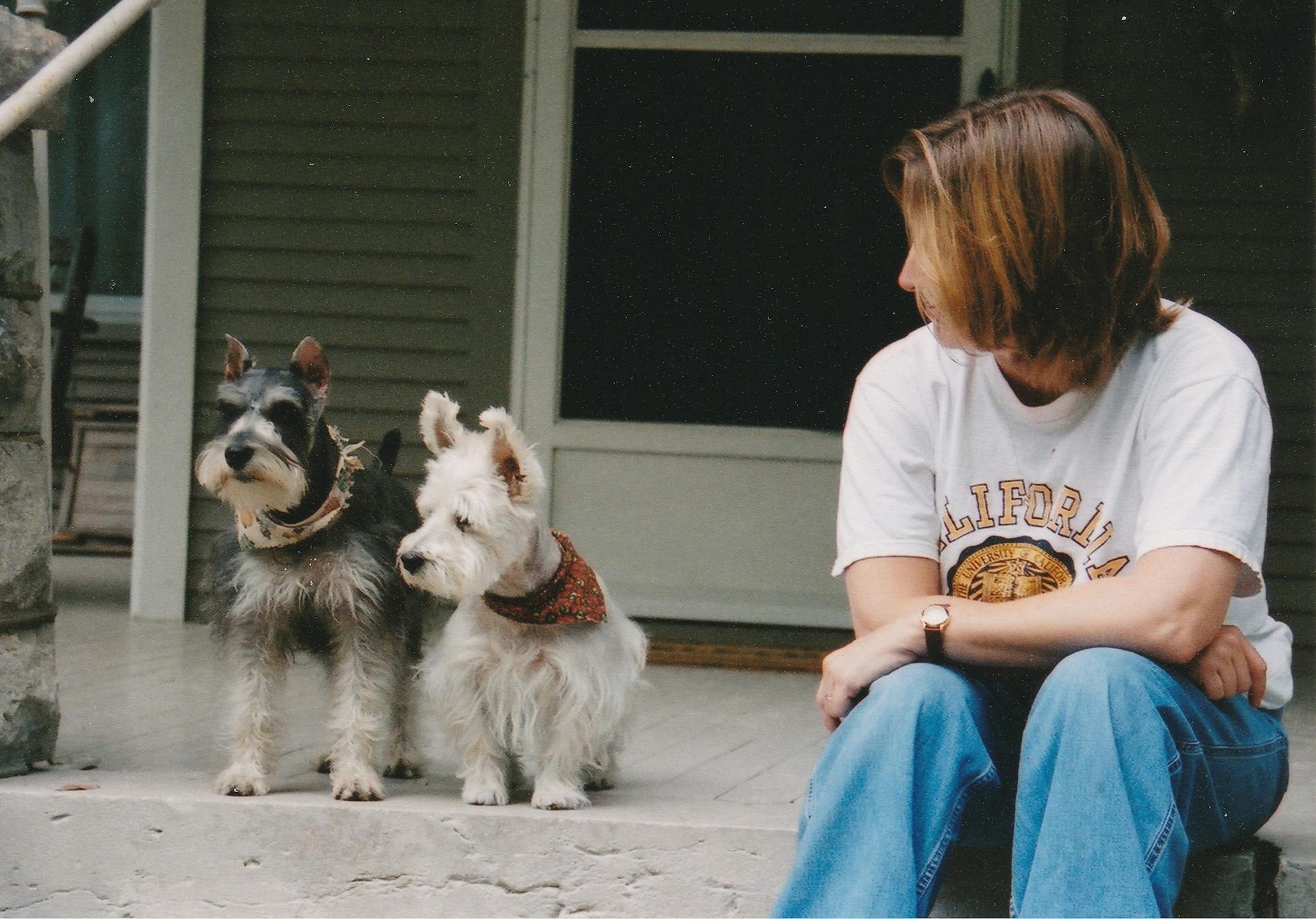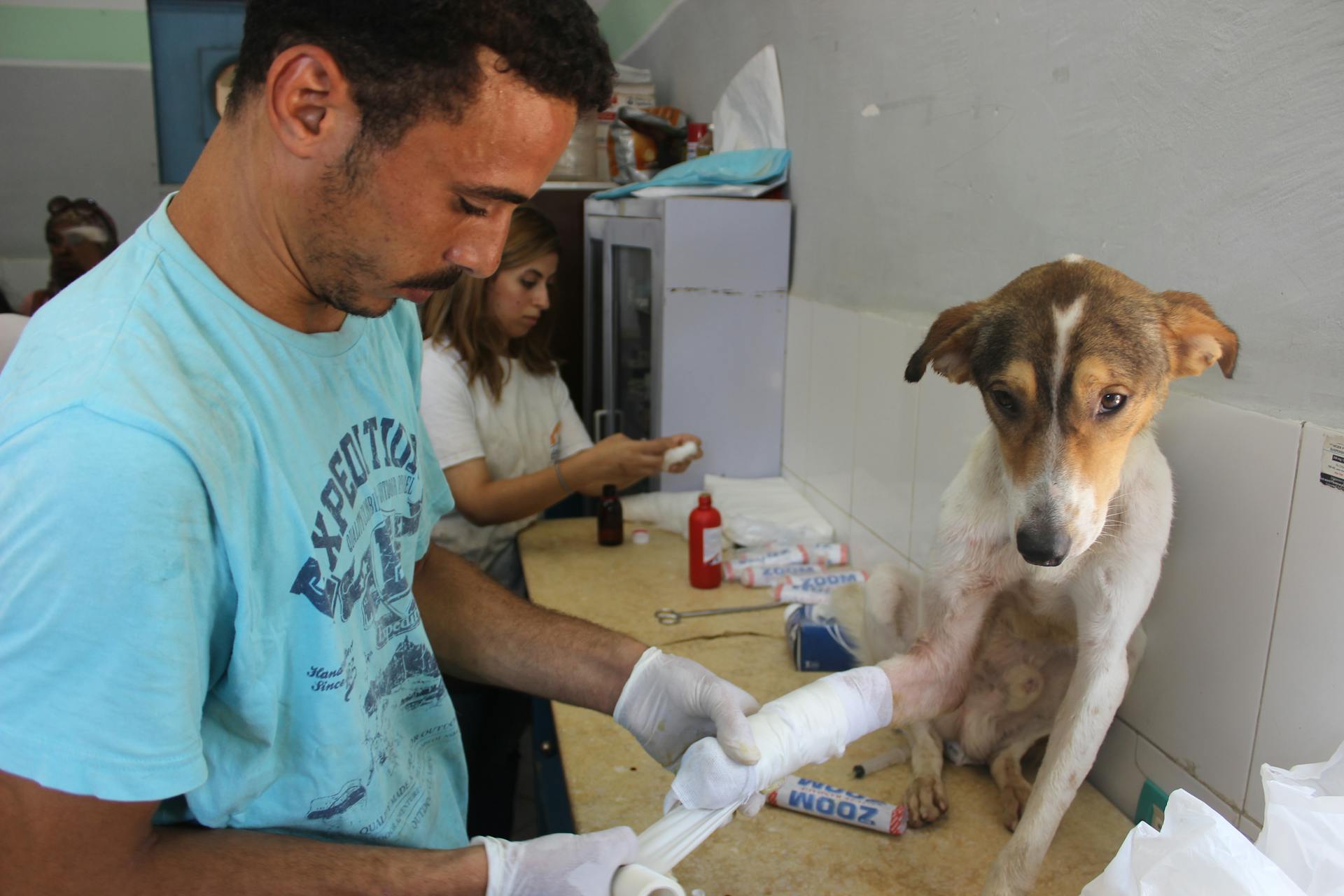
Kennel cough pneumonia can be a serious and potentially life-threatening condition for dogs. It's caused by a combination of viral and bacterial infections, specifically Bordetella bronchiseptica and other pathogens.
If your dog is at risk of developing kennel cough pneumonia, it's essential to take preventative measures. This includes getting your dog vaccinated against Bordetella bronchiseptica, which is usually required for boarding and daycare facilities.
Preventing kennel cough pneumonia also involves maintaining good hygiene practices, such as washing your hands frequently and keeping your dog's environment clean.
For more insights, see: Bordetella vs Kennel Cough
What is Kennel Cough Pneumonia?
Kennel Cough Pneumonia is a serious condition that can develop from a mild case of kennel cough.
It's caused by a secondary bacterial infection that takes hold in the lungs.
This secondary infection can be triggered by a variety of bacteria, including Bordetella bronchiseptica, Streptococcus equi, and Pasteurella multocida.
Symptoms of kennel cough pneumonia can include a persistent cough, difficulty breathing, and a blue-tinged tongue and lips.
In severe cases, pneumonia can progress to bronchitis or even pleurisy, which can be life-threatening if left untreated.
Readers also liked: Dog Upper Respiratory Infection vs Kennel Cough
What Is Kennel Cough?
Kennel cough is a highly contagious respiratory infection caused by the Bordetella bronchiseptica bacteria, which affects dogs of all ages and breeds.
The bacteria spread through the air when an infected dog coughs or sneezes, releasing droplets that contain the bacteria.
Kennel cough is often associated with crowded environments, such as dog kennels, shelters, and dog parks, where dogs are more likely to come into contact with each other.
Symptoms of kennel cough can include a persistent, hacking cough, runny nose, and loss of appetite.
Related reading: Kennel Cough Bacteria
What is Pneumonia?
Pneumonia is a type of lung infection that can be caused by a variety of factors, including bacteria, viruses, and fungi.
It affects the air sacs in the lungs, causing them to fill with fluid and making it difficult for the lungs to get the oxygen they need.
Pneumonia can range from mild to severe, and in severe cases, it can be life-threatening.
The symptoms of pneumonia can vary depending on the type and severity of the infection, but common symptoms include coughing, fever, and difficulty breathing.
Additional reading: Cures for Kennel Cough
In people with weakened immune systems, such as the elderly or those with certain chronic health conditions, pneumonia can be a serious concern.
Pneumonia can be caused by a variety of viruses and bacteria, including Streptococcus pneumoniae, which is a common cause of pneumonia in dogs.
The Centers for Disease Control and Prevention (CDC) report that pneumonia is a leading cause of illness and death in the United States.
Suggestion: Can Cats Get Pneumonia from Humans?
Causes and Prevention
Kennel cough pneumonia is a serious condition that can affect dogs, and understanding its causes and prevention is crucial for pet owners. Kennel cough in dogs can be caused by multiple bacteria and viruses, including Bordetella bronchiseptica, canine adenovirus, and parainfluenza virus.
Dogs can contract kennel cough from infected objects, such as shared toys, food bowls, or water bowls, as well as from the respiratory secretions of an infected dog. This can happen through coughing or sneezing, and dogs can also get infected by using an item that another dog with the infection has used.
To prevent kennel cough, vaccination against one of the common causes, such as Bordetella bronchiseptica, is generally recommended. You can also take steps to reduce the risk of your dog contracting this contagious disease by keeping your dog's vaccinations up to date, limiting exposure to unfamiliar dogs, and practicing good hygiene.
Here are some key ways to prevent kennel cough:
- Vaccination: Keep your dog’s vaccinations up to date, including the kennel cough vaccine.
- Limit Exposure: Avoid situations where your dog is in close contact with unfamiliar dogs.
- Hygiene: Ensure good hygiene practices, such as cleaning and disinfecting shared objects and avoiding contaminated areas.
Causes
Kennel cough is caused by a combination of bacteria and viruses, including Bordetella bronchiseptica, canine adenovirus, parainfluenza virus, and more.
The most common cause of kennel cough is a bacteria known as Bordetella bronchiseptica, which can work with a virus like canine distemper or parainfluenza to weaken a dog's immune system.
Dogs can contract kennel cough through respiratory secretions from an infected dog, which can be spread through coughing or sneezing.
Kennel cough can also be spread through contact with infected objects, such as toys, food bowls, or water bowls, which can harbor bacteria for up to 48 hours.
For another approach, see: Is Canine Influenza the Same as Kennel Cough

Dogs are most likely to contract kennel cough in crowded areas, including animal shelters, boarding kennels, dog daycare facilities, grooming facilities, and dog parks.
Here are some common ways dogs can get infected:
- Coughing or sneezing from an infected dog
- Contact with infected objects, such as toys or food bowls
- Animal interactions, such as playing or licking another infected dog
Prevention
Prevention is key when it comes to kennel cough, and there are several steps you can take to reduce the risk of your dog contracting this contagious disease.
Vaccination is one of the most effective ways to prevent kennel cough. The Bordetella vaccine is recommended for dogs that spend a fair amount of time around other dogs, and it can be administered in three different forms: injection, nasal mist, and oral medication.
You should ask about vaccine requirements when looking for grooming facilities, daycare facilities, or general doggy play date partners. This will ensure the dogs your pup will be in contact with are also vaccinated.
Limiting exposure to unfamiliar dogs, especially during outbreaks in your area, is also crucial. Kennel cough can be transmitted before symptoms appear, so it's essential to be proactive.
Here's an interesting read: Kennel Cough When to Worry

Good hygiene practices, such as cleaning and disinfecting shared objects, can also help prevent the spread of kennel cough. If your dog is showing symptoms, keep them isolated from other dogs to prevent further spread of the disease.
Here are some preventative measures you can take:
- Vaccination: Keep your dog's vaccinations up to date, including the kennel cough vaccine.
- Limit Exposure: Avoid situations where your dog is in close contact with unfamiliar dogs.
- Hygiene: Ensure good hygiene practices, such as cleaning and disinfecting shared objects.
- Isolate Sick Dogs: If your dog shows symptoms of kennel cough, keep them isolated from other dogs.
Signs and Symptoms
A dog can carry kennel cough and show no symptoms at all, making it difficult to keep them away from other dogs.
The most common symptom of kennel cough is a dry, hacking cough that may be followed by gagging or retching. This cough can sound far worse than it is, but it's usually harmless and will go away within a couple of weeks.
Some dogs may also develop a fever, seem lethargic, or show signs of pneumonia, although these complications are extremely rare.
Here are some common symptoms of kennel cough:
- Persistent Coughing: A dry, hacking cough that sounds like honking or gagging with a retch or a hack at the end of the cough.
- Sneezing and Nasal Discharge: Some dogs may have sneezing fits and develop a clear or slightly mucus-like nasal discharge.
- Low-grade Fever: Affected dogs may run a mild fever.
- Loss of Appetite and Lethargy: Dogs experiencing symptoms might lose interest in food and appear less energetic than usual.
Diagnosis and Treatment
Diagnosing kennel cough pneumonia in dogs typically involves examining the dog's symptoms, medical history, and response to therapy. Your vet will look for signs of pneumonia, such as difficulty breathing, and will consider the dog's overall health and age.
Diagnostic testing is usually not necessary, but it may be recommended in certain cases, including dogs with suspected pneumonia, those that don't respond to supportive care, and dogs with signs of systemic disease. Your vet may also recommend testing if an outbreak is occurring in multiple dogs.
Treatment for kennel cough pneumonia typically involves rest, allowing the infection to run its course, and may include antibiotics to prevent secondary infections or cough suppressants to ease the continuous coughing. Recovery from kennel cough typically takes one to two weeks, but if symptoms persist beyond this timeframe, scheduling a follow-up appointment with your vet is crucial.
Here are some common treatment options for kennel cough pneumonia:
- Rest: Giving your dog plenty of rest to help their immune system fight off the infection.
- Cough Suppressants: Prescribed by your vet to alleviate your dog's discomfort and reduce the frequency of coughing episodes.
- Antibiotics: If the underlying cause is a bacterial infection, antibiotics may be prescribed to treat the infection.
Diagnosing
Diagnosing kennel cough in dogs can be a bit tricky, but veterinarians have a process to help determine if your furry friend has it.
A diagnosis is typically made based on a dog's symptoms, history, and response to therapy.
Your vet will examine your pet to rule out other possible conditions that share similar symptoms, such as collapsing trachea, heartworm disease, bronchitis, asthma, cancer, and heart disease.
If your dog is showing signs of pneumonia, systemic disease, or doesn't respond to supportive care, diagnostic testing is usually recommended.
In cases where an outbreak is occurring in multiple dogs, testing may also be necessary.
Here's a summary of when diagnostic testing is recommended:
- Dogs where pneumonia is suspected
- Dogs that do not respond to supportive care
- Dogs with signs of systemic disease
- If an outbreak is occurring in multiple dogs
Possible Treatments
If your dog has kennel cough, treatment is usually straightforward. Rest is often the best medicine, allowing the infection to run its course, just like a human cold.
Rest is key to helping your dog's immune system fight off the infection. Avoid strenuous exercise and activities that can exacerbate the cough.
In some cases, your vet may prescribe antibiotics to prevent secondary infections or cough suppressants to ease the continuous coughing. If your dog's symptoms are more severe, antibiotics may be prescribed to treat the infection.
Worth a look: Antibiotics to Treat Kennel Cough
A humidifier can help alleviate symptoms by adding moisture to the air. Running a humidifier in rooms where your dog spends most of its time may be beneficial.
Recovery from kennel cough typically takes one to two weeks for dogs. If your dog's symptoms persist beyond this timeframe, scheduling a follow-up appointment with your vet is crucial.
Here are some possible treatments for kennel cough:
- Rest: Giving your dog plenty of rest will help their immune system fight off the infection.
- Cough Suppressants: In some cases, your vet may prescribe cough suppressants to alleviate your dog’s discomfort and reduce the frequency of coughing episodes.
- Antibiotics: If the underlying cause is a bacterial infection, antibiotics may be prescribed to treat the infection.
Frequently Asked Questions
How do I know if my dog has pneumonia?
Watch for signs like difficulty breathing, coughing, and green or yellow mucus in your dog's nose or after coughing. If you notice these symptoms, seek veterinary attention immediately to determine if your dog has pneumonia
What are the 4 stages of pneumonia in dogs?
Pneumonia in dogs progresses through four stages: congestion, red hepatization, grey hepatization, and resolution, each with distinct characteristics. Understanding these stages is crucial for accurate diagnosis and effective treatment of canine pneumonia.
What does a pneumonia cough sound like in dogs?
A pneumonia cough in dogs is typically deep and soft, with possible coughing up of mucus. The cough may sound loud and harsh or soft due to impaired lung circulation.
Sources
- https://www.petmd.com/dog/conditions/respiratory/kennel-cough-dogs-symptoms-and-treatments
- https://www.pethealthnetwork.com/dog-health/dog-diseases-conditions-a-z/kennel-cough-signs-and-symptoms
- https://www.brodheadsvillevet.com/site/blog/2024/03/15/what-is-kennel-cough-in-dogs-symptoms-treatment--prevention
- https://www.trupanion.com/pet-blog/article/kennel-cough-in-dogs
- https://vetsoftherockies.com/education/kennel-cough-understanding-canine-infectious-respiratory-disease-complex/
Featured Images: pexels.com


